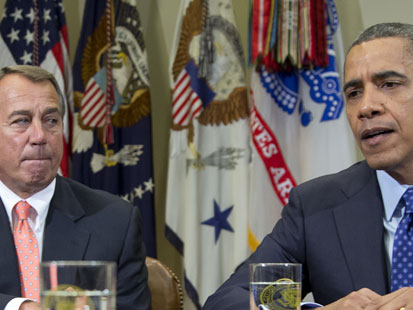
(Brendan Smialkowski/AFP/Getty Images)
Bradley Manning’s former guards testified today that they did not intimidate the man accused of leaking hundreds of thousands of classified cables to the anti-secrets website Wikileaks during a Jan. 18, 2011 incident that resulted in Manning being placed on a temporary suicide risk watch.
Manning’s attorneys cite the event as a key reason why his pre-trial confinement at the Marine brig in Quantico, Va., was unlawful and warrants the dismissal of the charges against him.
Manning faces life imprisonment on charges that he leaked the classified military and diplomatic cables to Wikileaks. Details of those charges will come at a trial scheduled for February and are not being discussed at this week’s hearing, which is focused on his nine-month confinement at Quantico from July 2010 to April 2011.
On Jan. 18, 2011 Manning was being moved to his daily “recreation call” in a room at the brig when he experienced an apparent anxiety attack. Manning said Thursday the guards escorting him seemed to have an aggressive attitude that made him feel nervous and ultimately feel faint.
Manning testified Thursday that he “lost my demeanor” during a later discussion with brig officials about the incident that led them to place him on temporary suicide risk watch.
Former Marine guards Lance Corporal Joshua Tankersly and Lance Corporal Jonathan Cline testified today that Manning had been moving around while his hand and leg restraints were placed on him for the escort to the exercise room. They said they reminded Manning that he should respond properly to their orders by referring to their ranks when he answered them.
When Manning entered the recreation room they described a situation in which Manning fell backwards and landed on his backside.
They then said that when out of his leg restraints Manning ran to a weightlifting machine, hid behind it and began to cry. Both Cline and Tankersly said they could not explain Manning’s behavior. Both guards were ordered to leave the room and were replaced by two other guards who escorted Manning back to his cell.
Cline said he was puzzled when a supervisor later told him “we intimidated him or something like that.”
Each guard said he could not recall if they sounded harsh when they talked to Manning on the way to the exercise room.
They both said that aside from the January incident, Manning was courteous and professional in his interactions with them. Both described him as an average prisoner, though Tankersly acknowledged that Manning was a high profile detainee who had the attention of high-ranking officials at the base.
“It’s hard to put ‘average’ on such a high profile, when you have higher ups on base come and check through to that see all was OK,” Tankersly said.
Gunnery Sgt. William Fuller, one of the senior officers at the brig, also testified today about his participation in a Classification and Assessment board that routinely assessed whether Manning’s Maximum Custody and Prevention of Injury status should be downgraded. The board never reduced Manning’s status during his stay.
Fuller acknowledged that before the January incident he and another brig official had considered a downgrade because Manning was “doing pretty good.”
He said the Jan. 18incident “kind of reset things … we had to keep him on Prevention of Injury.”
Fuller also cited Manning’s quiet interactions with him as a reason for keeping Manning on that status.
According to Fuller “he wouldn’t communicate … it seemed like he didn’t really want to talk” and that concerned him, given training he had received that being withdrawn could be an indicator of suicidal behavior.
Fuller admitted that the conversations were really just quick interactions to see how Manning was doing.. When asked to provide examples of longer exchanges he had with other prisoners, Fuller provided brief sentences. That led David Coombs, Manning’s defense attorney to say sarcastically, “so if he’d thrown in more words then he would have classified as a Chatty Patty?”
Manning’s attorneys claim that a protest on Jan. 17 by Manning supporters, at the entrance to the base, may have motivated an aggressive attitude towards the detainee.
Cline recalled other guards “were annoyed” by the protest” because it would close parts of the base and hinder or interrupt how they got home.” But Tankersly said the protest had no impact on Manning’s treatment.










